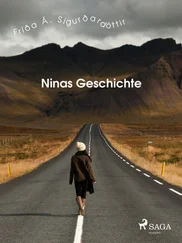‘Well of course.’ An icy wind blew around the house and Katrín felt the cold air slip in beneath her jacket. The chill it gave her, however, was quickly forgotten when a long plank that Garðar was working on came free, providing a glimpse of the earth that had lain untouched beneath the porch for decades, maybe even an entire century. At first glance it was unremarkable, merely dark and indistinguishable, but after a moment she noticed yellowish stripes in the black soil. ‘What’s that?’
Garðar put down the broken plank and looked into the gap. ‘I don’t know.’ He bent down and poked at the soil. ‘These are bones. Bird bones, it looks like.’ He brushed away the dry soil and pulled out two little bones, the size of fingers.
‘No, that doesn’t make sense.’ Katrín bent down to Garðar. The bones looked old and dirty. ‘They’re far too chunky. They must be from a sheep. But what are bones doing here?’ The same anxiety the crosses had awakened in her appeared again. She knew little or nothing about bones, but she knew enough to realize that these were too thick to belong to a bird. It suddenly crossed her mind that they were human. It would certainly put an interesting spin on things if the graves she feared were near the house were literally underneath it.
‘Ugh, that’s disgusting. Are you joking?’ Líf put down her drink can and peered over Katrín’s shoulder into the darkness.
‘It must be the remains of some food that fell under the porch, or else a fox dragged the bones here. Maybe there was a den here once. The house is old and the bones don’t look recent.’ Garðar continued to brush the soil away carefully and found more bones, now the entire skeleton of an animal which did in fact appear to be a fox. ‘See. Look. What did I tell you?’
‘Why is there a dead fox under the porch?’ Katrín looked as far beneath the porch as she could, but saw nothing except darkness. ‘Don’t they usually die in their dens?’
‘Probably they’re just as likely to die anywhere. Maybe the poor thing starved here during a spell of bad weather.’ He shrugged. ‘And I’d guess these two bones we found first are from the fox as well.’ Garðar held up the bones in question, which didn’t actually appear to fit anywhere in the seemingly intact skeleton lying in the soil beneath them. But none of them said anything. The only sound that emerged from the group into the twilight was Putti’s whine as he sniffed hopefully at the bones in Garðar’s hand then backed away, thwarted.
It wasn’t until they were snuggled up close to each other in their zipped-together sleeping bags that Katrín realized Garðar’s explanation didn’t really fit. In rural areas, foxes keep themselves far from human habitations and would never make a den under a house like this. But Garðar was asleep and Katrín refrained from nudging him awake to share her revelation with him. She was even less keen on disturbing Líf, who also lay fast asleep beside them, the dog curled up but alert on top of her sleeping bag. Instead she pondered how the bones had ended up beneath this rickety porch, falling asleep before she reached any conclusion.
Katrín’s breathing had long since become regular when a vague human voice drifted up from downstairs; a soft child’s voice, which seemed to repeat the same indistinguishable words over and over. They were too exhausted to be woken up by it, or to let Putti’s low growl disrupt their sleep.
The woman was doing a little better, and seemed less agitated than during Freyr’s last visit. Otherwise everything was precisely the same as it had been the day before, so that the two visits seemed to merge into one. The woman sat in the same chair, staring out of the same window; in the air hung the same cinnamon smell, as if the same rice pudding were always being served. The worn, crocheted shawl was draped slightly further to the left over her shoulder and she’d forgotten to do up the top button on her blouse, revealing her bra’s beige shoulder strap. Otherwise, all identical: even the ladder in her thick nylon stockings showing beneath the hem of her skirt was in place. ‘I understand you didn’t want to go out yesterday. Do you remember that you didn’t think it was such a bad suggestion when I mentioned it to you? It’s good to take advantage of the nice weather while it lasts.’ Freyr spoke louder than usual. The woman wore a hearing aid and had a tendency to lose the thread. ‘And you remember what I told you about the importance of going out for regular walks? They don’t need to be long ones if you’re tired or a bit under the weather, but you’ll feel better if you get some fresh air, even if it’s only for a short time, Úrsúla.’
‘I don’t want to go out.’ The woman’s voice was lifeless and piteous, as if each breath could be her last. ‘Not now. I don’t want to be here.’
Freyr didn’t quite know how to reply. Úrsúla had had nearly a year to become accustomed to her new surroundings, but she appeared to be adjusting very slowly. They didn’t actually expect her to adapt fully to her new circumstances – the move to this nursing home had occurred rather quickly; when no other solutions were available, the decision had been made to bring her here – but Freyr had originally hoped for significant progress.
She was something of a loner; born in 1940, she had no close relatives besides a decrepit older brother who was living in Ísafjörður, which had most likely influenced the decision to move her here, along with the fact that the woman’s last legal residence had been in Ísafjörður before she fell ill at an early age and was sent to a hospital in Reykjavík. She hadn’t set eyes on the town for more than half a century; when she went to Reykjavík she was a teenager with a serious mental disorder, experiencing hallucinations and constantly plagued by fear and anxiety, and when she returned home her life was more or less over; she had grown old and there was little ahead.
In light of the woman’s condition it was unclear whether she would ever feel comfortable in her new home. She’d been an outsider as a child and had a difficult upbringing; her illness had probably started to manifest itself without anyone really noticing, and she was written off as an antisocial and rather boring kid, which meant she didn’t even have any happy childhood memories to comfort herself with. Yet she had still been sent here. This kind of decision was one of the reasons why Freyr didn’t want to have to concentrate only on his specialism, psychiatry; conventional general medicine was freer from the red tape and endless compromises of the psychiatric set-up. Úrsúla was a clear example of the system’s ruthlessness and lack of compassion, which grated against Freyr’s professional ambition. She was among the twelve residents who were forced to find refuge elsewhere when Department 7 of Kleppur Mental Hospital was closed. For decades the department had been run as a specialized treatment facility for people with chronic mental illness and severe behavioural disturbances; some of the patients, including Úrsúla, had been housed there for years, even decades. Freyr struggled to accept the argument that permanent residence in hospitals didn’t accord with modern healthcare practices or humanitarian considerations. No doubt that was true for some, but not for those who were in their advanced years and viewed the department as their home. He suspected that the nearly thirty full-time salaries saved by the closure of the department had weighed heavier than humanitarian considerations. ‘There’s nothing unusual about you taking a bit of time to get used to a new place. But hopefully it won’t take long for you to come to terms with being in Ísafjörður.’
Читать дальше










